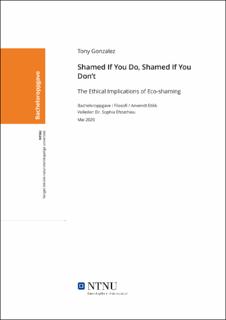| dc.contributor.advisor | Efstathiou, Sophia | |
| dc.contributor.author | Gonzalez, Tony | |
| dc.date.accessioned | 2020-06-26T16:00:33Z | |
| dc.date.available | 2020-06-26T16:00:33Z | |
| dc.date.issued | 2020 | |
| dc.identifier.uri | https://hdl.handle.net/11250/2659701 | |
| dc.description.abstract | Kjøttskam er et eksempel på det som kollektivt har blitt kjent som økoskam: et konsept som har blitt grundig innarbeidet i vår nåværende tidsånd. Vi blir presset til å føle moralsk skam over handlinger som blir sett på som skadelige for andre ikke-menneskelige dyr og miljøet i sin helhet, ting som i mesteparten av det moderne vestlige samfunn anses som moralsk irrelevant. Gitt hvor viktig klimakrisen er, og dermed også behovet for å motivere folk til handling, kan kanskje økoskam være et nyttig verktøy i denne kampen. Denne oppgaven utforsker hvilke mulige effekter kjøttskam kan ha innenfor de hovedsakelig antroposentriske etiske systemene som er dominerende i kontemporær vestlig kultur. Jeg argumenterer for at et radikalt skifte i vårt moralske fundament som inkluderer alt ikke-menneskelig liv er nødvendig, da økoskam i praksis i beste fall vil føre til passivitet, i verste fall til en ødeleggende separasjon fra andre. Videre stiller jeg spørsmål ved om skambelegging, selv på et gyldig grunnlag, i det hele tatt bør anses som moralsk tillatelig. Oppgaven konkluderes med å foreslå at forbyggende utdannelse og empati er mulige løsninger i stedet for kjøttskam på problemene skapt av kjøttindustrien og den påfølgende kjøttskammen den har vært opphavet til. | |
| dc.description.abstract | Meat-shaming is an instance of what has become known collectively as eco-shaming: now thoroughly ingrained in our current zeitgeist. We are being pressured to feel moral shame over actions that are viewed as harmful towards other non-human animals and the environment at large, things that in most of modern western society are considered morally irrelevant. Given how important the climate crisis is, and the need to move people to action, perhaps eco-shaming is a useful tool. This paper explores what kind of effects meat-shaming could have within the predominantly anthropocentric ethical systems currently in place, in Western cultures. I argue that, rather, a radical shift in our moral groundworks to include other non-human living entities is needed, as eco-shaming practices like this will at best lead to inaction, at worst to a crippling disconnect from others. Furthermore, I question whether shaming, even on valid grounds, should ever be considered morally permissible. This paper concludes by suggesting that employing preemptive educational tactics and empathy in place of meat-shaming practices are possible solutions to the problems brought on by the factory farming industry and the subsequent meat-shaming practices it has spurred. | |
| dc.publisher | NTNU | |
| dc.title | Shamed If You Do, Shamed If You Don’t: The Ethical Implications of Eco-shaming | |
| dc.type | Bachelor thesis | |
